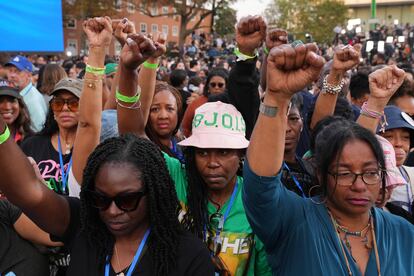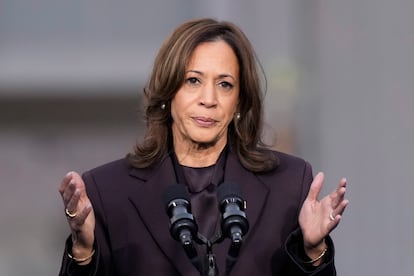Black women deserve much more
Representation is not liberation. The United States is a deeply racist country where even a Kamala Harris victory would not have been enough

As election night progressed and Donald Trump’s victory became clear, until it was no longer in doubt after he carried the state of Pennsylvania, I watched on American news as every pundit, expert, analyst, and strategist tried to explain why Kamala Harris was not going to be the next president of the United States. Since Tuesday, her defeat has been blamed on the vice president herself, on President Joe Biden, and on the Democratic Party in general. Everyone has been holding their head in their hands, asking how such a failure was possible. But I wonder: did we ever really believe that the United States would elect a Black woman as president?
Have we forgotten that the U.S. has been a deeply racist country from the very beginning? The America in which Kamala Harris can become vice president, presidential candidate and almost president with 68 million votes, is still the America where our enslaved ancestors were exploited in the broadest sense of the word. It is also the America of the Jim Crow era, of the rape and plundering of the Black female body, of the lynching of Black mothers and girls that have been erased from the history books.

This is the same country where Black mothers continue to mourn the murders of their sons at the hands of police, or whose families have been torn apart by the unjust and mass incarceration of their fathers or husbands. This is also the country where we are missing Breonna Taylor and hundreds of other Black women shot and killed by police, and where today a pregnant Black woman is three times more likely to die during pregnancy or in the months following childbirth than a white woman. This is the United States, supposedly the land of opportunity, where Black women earn 65% of what white men do (white women, meanwhile, reach 83%).
Given all this, it is no surprise that Donald Trump is back in the White House. We cannot forget our history. We need to be able to see that 19th-century racism is still systemic and understand the ways in which it continues to dictate the reality of African Americans, and in particular, Black women. Racial discrimination and misogyny go hand-in-hand, and until we are willing — as progressives — to understand and address that intersectionality, we will remain trapped in the same cycle, in which the other side will continue to emerge victorious.
A few weeks before the election, I was talking to a left-leaning friend of mine, disillusioned with the Democratic Party, who said: “My dreams for the Black community in this country go far beyond a Black woman president. In fact, that’s not even on my list of aspirations.” She voted for the Democratic candidate, as did the vast majority of the Black population, but she did so knowing that a Kamala Harris presidency would not bring the change for which she yearns; that representation does not mean liberation, and that Black women deserve so much more.
Sign up for our weekly newsletter to get more English-language news coverage from EL PAÍS USA Edition
Tu suscripción se está usando en otro dispositivo
¿Quieres añadir otro usuario a tu suscripción?
Si continúas leyendo en este dispositivo, no se podrá leer en el otro.
FlechaTu suscripción se está usando en otro dispositivo y solo puedes acceder a EL PAÍS desde un dispositivo a la vez.
Si quieres compartir tu cuenta, cambia tu suscripción a la modalidad Premium, así podrás añadir otro usuario. Cada uno accederá con su propia cuenta de email, lo que os permitirá personalizar vuestra experiencia en EL PAÍS.
¿Tienes una suscripción de empresa? Accede aquí para contratar más cuentas.
En el caso de no saber quién está usando tu cuenta, te recomendamos cambiar tu contraseña aquí.
Si decides continuar compartiendo tu cuenta, este mensaje se mostrará en tu dispositivo y en el de la otra persona que está usando tu cuenta de forma indefinida, afectando a tu experiencia de lectura. Puedes consultar aquí los términos y condiciones de la suscripción digital.









































